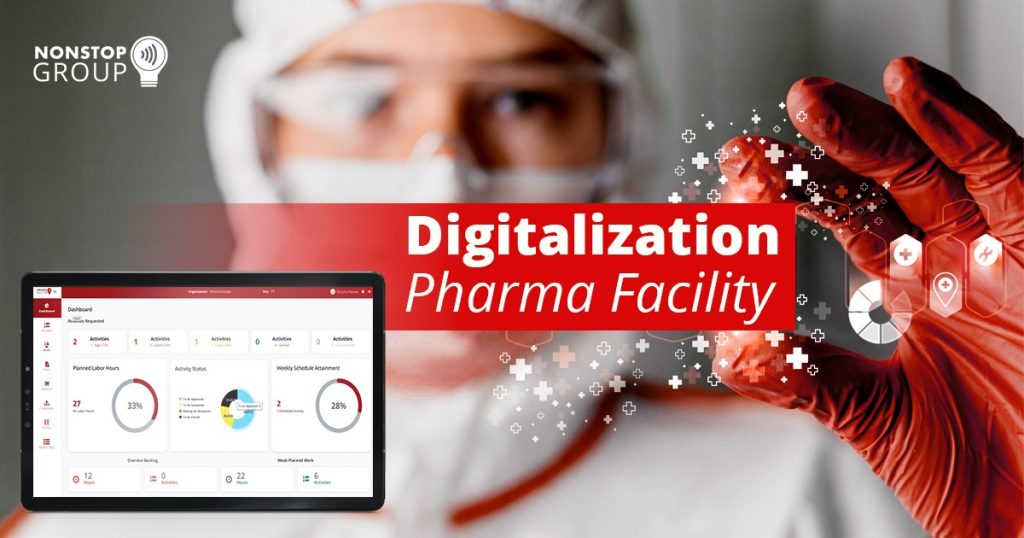6 Min Read

The digital revolution has transformed numerous industries, and the pharmaceutical sector is no exception. Digitalization has emerged as a formidable force, transforming the landscape of pharmaceutical operations and completely revolutionizing patient care.
Digitalization of pharma facilities is enhancing operational efficiency, improving patient outcomes, and propelling the industry forward. According to a study by Deloitte, digitalization can reduce clinical trial timelines by up to 30% and decrease overall drug development costs by 20%. Automation of processes, electronic health records, and digital communication have streamlined operations, resulting in faster drug discovery and development.
In this guide, we will explore the intricacies of digitalization in the pharmaceutical industry, highlighting its importance and the key technologies driving this transformation. Let’s dive in!
What is Digitalization in The Pharma Industry?
Digital transformation refers to incorporating digital technologies into all aspects of a business or industry, fundamentally changing how it operates and delivers value.
In the pharmaceutical industry, digital transformation entails leveraging advanced technologies to optimize processes, enhance decision-making, and ultimately improve patient outcomes. It is pivotal in driving growth, improving operational efficiency, and enhancing patient care.
Digital transformation involves adopting CMMS (Computerized Maintenance Management System) IoT devices, AI algorithms, cloud computing, machine learning models, digital twin technology and big data analytics platforms. It enables companies to optimize manufacturing facilities, ensure regulatory compliance, and expedite research and development.
Furthermore, digitalization empowers pharmaceutical companies to manage their supply chains efficiently, leading to enhanced inventory management and cost savings. Ultimately, integrating digital technology into the pharma facility revolutionizes the industry and sets the stage for future advancements.
Smarter Asset Tracking With NFC Tags
Learn more about how NonStop Suite's NFC Asset Tracking Solution can help your Enterprise streamline operations to new heights.
Get A Free Product Tour
What is an Example of Digital Innovation in the Pharmaceutical Industry?

An exemplary instance of digital innovation in the pharma industry is the implementation of electronic health records (EHRs) and data analytics.
EHRs digitize and consolidate patient medical information, allowing healthcare providers to access, update, and share patient data seamlessly across various platforms. This digital transformation enhances the efficiency, accuracy, and accessibility of medical records, thereby improving patient care and safety.
Furthermore, integrating data analytics into pharmaceutical processes has revolutionized research and development (R&D), clinical trials, and drug safety monitoring.
Pro Tip
The Dynamic eForms by the NonStop Suite constitutes an exceptional solution that empowers your pharma company to embrace an advanced workflow, transcending the limitations of traditional paper forms. By automating every facet of documentation across your business, Dynamic eForms revolutionize data recording, storage, accessibility, sharing, and retrieval.
Why is Digitization Important in the Pharmaceutical Industry?
Digitalization enables pharmaceutical companies to streamline processes, drive innovation, and improve patient outcomes. From streamlining administrative tasks to optimizing drug discovery and enhancing patient care, digitalization has revolutionized various aspects of healthcare.
Embracing digital transformation, the pharmaceutical industry continues to yield numerous benefits that positively impact various aspects of the industry, including these five:
Enhanced Operational Efficiency:
Digitalization streamlines manufacturing operations, optimizing resource allocation and reducing manual errors. Through the automation of routine tasks and real-time data analysis, pharmaceutical companies can improve productivity, reduce costs, and accelerate time-to-market for new drugs.
Improved Quality Control and Compliance:
Digital quality management systems enable companies to monitor and control the quality of their products throughout the entire pharmaceutical manufacturing process. By leveraging IoT devices, AI algorithms, and advanced analytics, pharmaceutical facilities can ensure adherence to regulatory requirements, enhance product safety, and mitigate risks.
Accelerated Research and Development:
Digitalization expedites the drug discovery and development process. With advanced AI and machine learning capabilities, researchers can analyze vast amounts of data, identify potential drug targets, and simulate drug interactions. This efficiency helps in reducing the time and cost associated with traditional trial-and-error approaches.
Enhanced Supply Chain Management:
Pharmaceutical companies can optimize supply chains by improving demand forecasting, inventory management, and logistics. By integrating data from multiple sources and applying advanced analytics, companies can obtain valuable insights into pertinent factors influencing demand. This heightened visibility enables pharmaceutical companies to enhance supply chain visibility, reduce lead times, and respond more effectively to market fluctuations.
Better Patient Outcomes:
Digitalization facilitates personalized medicine through the use of AI-driven predictive analytics. By analyzing patient data, including genetics, lifestyle, and medical history, healthcare providers can tailor treatments to individual patients. Ultimately leading to enhanced treatment effectiveness and improved patient outcomes.
Pro Tip
Digitally transform your pharmaceutical facilities with The NonStop Suite. This smart digital solution allows your company to transition towards a simplified, smarter, faster, and highly efficient management process. Ultimately, optimizing processes and workflows, improving supply chain management, expedites research and development, and enhances patient outcomes.
What Digital Technologies are Driving Digitalization in Pharma Facilities?
Technological advancements are propelling the digitalization wave, revolutionizing pharmaceutical processes, enhancing efficiency, and optimizing outcomes.
Detailed below are some of these transformative technologies and their influence on the digital transformation of pharmaceutical facilities:
Internet of Things (IoT) Applications:
IoT applications play a pivotal role in driving digitalization within pharmaceutical facilities. Integrating IoT devices and sensors enable the collection and transmission of vast amounts of real-time data.
IoT applications empower facility managers to monitor critical variables remotely, promptly identify potential bottlenecks or deviations, and take proactive measures to maintain optimal conditions.
Sensor Technology for Real-Time Monitoring:
Sensors embedded in pharmaceutical facilities enable real-time monitoring of various parameters, such as temperature, humidity, air quality, and equipment performance. This data provides insights into potential risks, allows for proactive maintenance, and ensures optimal drug manufacturing and storage conditions.
Remote Patient Monitoring and Telemedicine:
IoT devices and wearable technologies allow for remote patient monitoring. Healthcare providers track vital signs, medication adherence, and disease progression. Moreover, telemedicine platforms facilitate remote consultations, minimizing the need for in-person visits and enhancing access to healthcare services.
Asset Tracking and Inventory Management:
IoT-enabled asset tracking systems enable pharmaceutical companies to monitor the location, condition, and usage of critical assets and inventory in real time. This streamlines supply chain operations, reduces wastage and ensures optimal inventory levels.
Pro Tip
Integrate the NonStop Suite into your pharmaceutical organization and drive significant advancements in operational efficiency, patient care, and innovation. This digital solution unlocks transformative efficiency, directly translating into heightened data accuracy, reliability, real-time monitoring, and enhanced collaboration.
Artificial Intelligence (AI) and Machine Learning (ML):
AI and ML have emerged as indispensable technologies in the digitalization of pharmaceutical facilities. These technologies facilitate intelligent decision-making using advanced algorithms to process and study extensive volumes of data and extract valuable insights. By employing AI and ML techniques, pharmaceutical facilities can:
- Expedite research and development processes,
- Improve patient outcomes through personalized medicine,
- Optimize inventory management, and
- Mitigate equipment failures by predicting maintenance requirements.
These advancements lead to enhanced efficiency, reduced costs, and improved pharmaceutical products and services.
Drug Discovery and Development:
AI and ML algorithms analyze vast amounts of genomic, proteomic, and clinical data to identify potential drug targets, predict drug efficacy, and simulate drug interactions. This accelerates the drug discovery and development process, decreasing costs and increasing the success rate of new drug candidates.
Predictive Analytics for Personalized Medicine:
With AI-driven predictive analytics, healthcare providers can analyze patient data and generate personalized treatment plans. This enables precision medicine, tailoring treatments to individual patients based on their unique characteristics. Ultimately, the pharma facility can ensure better treatment outcomes.
Enhancing Operational Efficiency and Automation:
AI and ML algorithms automate routine tasks, optimize resource allocation, and enhance operational efficiency in pharmaceutical facilities. These technologies enable predictive maintenance, quality control, and process optimization while reducing costs and improving overall efficiency.
Big Data and Analytics:
The pharmaceutical and life sciences industry generates an enormous volume of data throughout its value chain. Big Data and Analytics enable harnessing this vast data ecosystem for valuable insights and evidence-based decision-making.
By integrating data from disparate sources and applying sophisticated analytics techniques, pharma companies can comprehensively understand their operations, identify inefficiencies, and implement targeted improvements. The analysis of large datasets can facilitate trend identification, anomaly detection, and optimization of manufacturing processes.
Data-Driven Decision-Making in Drug Development:
Pharmaceutical facilities can leverage big data analytics to analyze extensive data from clinical trials, real-world evidence, and scientific literature. This data-driven approach aids in making informed decisions regarding drug development, target populations, and treatment strategies.
Real-World Evidence and Patient Outcomes Analysis:
Digitalization has made it far easier to analyze real-world data, including electronic health records, wearables, and patient-reported outcomes. With this thorough analysis, pharmaceutical facilities can gain insights into treatment effectiveness, safety profiles, and long-term patient outcomes. This real-world evidence informs clinical decision-making and supports post-marketing surveillance.
Supply Chain Optimization and Demand Forecasting:
Big data analytics enable pharmaceutical companies to optimize their supply chains by analyzing data from suppliers, logistics providers, and market trends. This allows for improved demand forecasting, inventory management, and supply chain optimization, reducing costs and ensuring timely delivery of drugs.
Conclusion: Embrace Digital Transformation in Pharma Facility!
Pharma companies must recognize the importance of digitalization and proactively embrace this transformative journey. Recognizing this need, The NonStop Group has come forth with a solution, “The NonStop Suite.”
The NonStop Suite is a comprehensive solution for your digitalization pharma facility needs. Packaged with smart digital tools and features, this asset care and management set enables your organization to keep pace with the ever-evolving digital era.
The NonStop Suite features Dynamic eForms, Smart NFC tags, and On-The-Go Asset Management capabilities. Seamlessly integrating these tools, the suite empowers your organization to optimize maintenance processes and enable advanced workflow automation. Real-time monitoring, diagnostics, analytics, and reporting functionalities are now easily accessible, just a few clicks away.
This systematic modernization equips your pharmaceutical organization with an accurate database, an organized documentation system, a transparent audit trail, data-driven decision-making capabilities, and reduced operational costs. So you can lead from the forefront of the industry, delivering better healthcare solutions and paving the way for a digitally empowered future.
Should you want to digitize your pharma facility, consult The NonStop Group today. Take advantage of our offer to book a FREE personalized product tour tailored to meet your unique needs and requirements.


